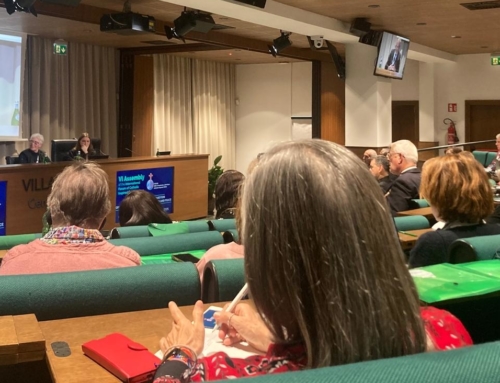12th of July 2023
The Spanish Presidency Semester, started on the 1st of July 2023 and has published the working program of priorities. The Federation welcomes the willingness to develop key policies involving the demographic challenges, equal treatment and inclusivity, caregiving and mental health, the protection of the environment and the technological revolution.
Our President Vincenzo Bassi, while sending the best wishes on behalf of FAFCE to all the persons involved in the Spanish Presidency, recommends “to underline the importance of the family as the center of public policy. Families are the key to address Europe’s challenges: demographic decline, equality between men and women, mental health, and the protection of the environment”. He also regretted that the Spanish Presidency working programme does not mention at all “families nor an inclusive approach where women, when mothers, pregnant or even caregivers are active and essential contributors of social and economic life”.
FAFCE wishes to give the following contribution to the current Presidency Semester in view of the implementation of the current priorities with the European Commission, which comes at a crucial historical moment for Spain and for the EU, under multiple aspects.
- The protection of families at the core of the fight against demographic challenges and decline
Spanish Presidency objective: Address the demographic challenge and the fight against depopulation.
The importance of addressing the demographic decline in Europe is key, not only in terms of economic policy and Europe’s resilience, but also in terms of freedom, in order to create the best conditions for parents to raise their children. The labour market should be designed for families and it is not up to the families to be shaped around the labour market. Families are the basis of society, and recognising their role has positive economic and social externalities.
Therefore, the demographic challenges should not be seen as questions concerning movement of people from cities to rural areas only, but they should be tackled with a comprehensive approach on how to promote a healthy family and work life balance with just parental policies, particularly maternity policies that do not punish or exclude pregnant women and mothers from developing a professional career. It is also a matter of intergenerational solidarity. FAFCE notes that “ageing by itself is not a risk to rural areas. The problem arises with depopulation, when young persons leave rural areas and the elderly are left on their own. Thus, the best way to fight ageing in rural areas is to create job opportunities for youth that sustain the family and mixed-generation living arrangements.”
- Maternity policies at the center of equality between men and women, and a healthy work-life balance
Spanish Presidency objective: Promote equal treatment and inclusivity, paying particular attention to gender equality and to children and persons with disabilities.
Equality policies need to respect the choice of families to have children. The respect of family life is the best solution to address current economic, demographic and social challenges. Parents are key for economic development, and they should be recognised not only as workers but also as members of a family. Pregnant women still suffer today the discrimination of a system which is envisaged only for men. The respect and freedom of women can only be fully achieved with maternity and paternity policies that respect the cycle of parenthood and respect personal professional and career aspirations. On the contrary, the skills and capacity of mothers should be highly valued and considered as an asset in the labour market. FAFCE considers that explicitly tackling maternal mobbing and discrimination should be taken into account.
- The fight on the issue of mental health should tackle work-life balance, loneliness and the right to disconnect: and families are key to the solution
Spanish Presidency objective: Complete the European Health Union, creating a European Health Data Space and strengthening EU action on caregiving and mental health.
As recognized by the European Commission in its communication on a comprehensive approach to mental health, families are key in tackling the issue of mental health: “A comprehensive approach must recognize the influence of biological and psychological factors, as well as the importance of the family, community, economy, society, the environment and security.” Family networks are agents of change and promoters of happiness and wellbeing for children, elderly and adults facing mental health issues, including depression. Family support has always been a source of detection of troubles as well as relief and support. Prioritizing family-friendly policies enable families to provide individuals with a sense of security, love, and belonging, which are all essential factors in maintaining good mental health.
- An efficient green transition involving families as educators and as primary economic actors
Spanish Presidency objective: Complete a socially just green transition, promoting the mitigation of the effects of climate change and taking into account social exclusion and energy poverty.
The protection of the environment is an urgency that involves proactive policy-making. Families have a key role to play as they are the center of intergenerational solidarity, the primary educators of new generations and the basic economic actors in terms of consumption practices as well as innovation. As FAFCE noted, “instead, consumerism and individualism should be addressed, looking at families as the best example of the optimisation of resources involving large economies of scale”. Families are also agents of poverty reduction. This is particularly evident when it comes to energy poverty.
- A technological revolution that protects children and promotes human development
Spanish Presidency objective: Place the European Union at the forefront of the technological revolution, fostering a regulatory framework that combines incentives for technological development and innovation and the defence of the EU users rights protection model.
The new technological devices can be instruments of communication, educational equality, fighting against loneliness or health innovation. However, the advancement of the digital policies should come hand-in-hand with the development of a legal framework which provides tools for parental control, abolition of child sexual abuse online and pornography, the reinforcement of the right to disconnect and spreading awareness about gaming disorder and the risk of addictive behaviour. It needs to ensure the effective implementation of the legal prohibition of children’s access to online pornography, and launch prevention programs to tackle the growing issue of self-generated sexually explicit material. FAFCE also recommends recognising online pornography as a general public health issue.
The purpose of digital technologies should be considered as an instrument, and never an end in itself.







